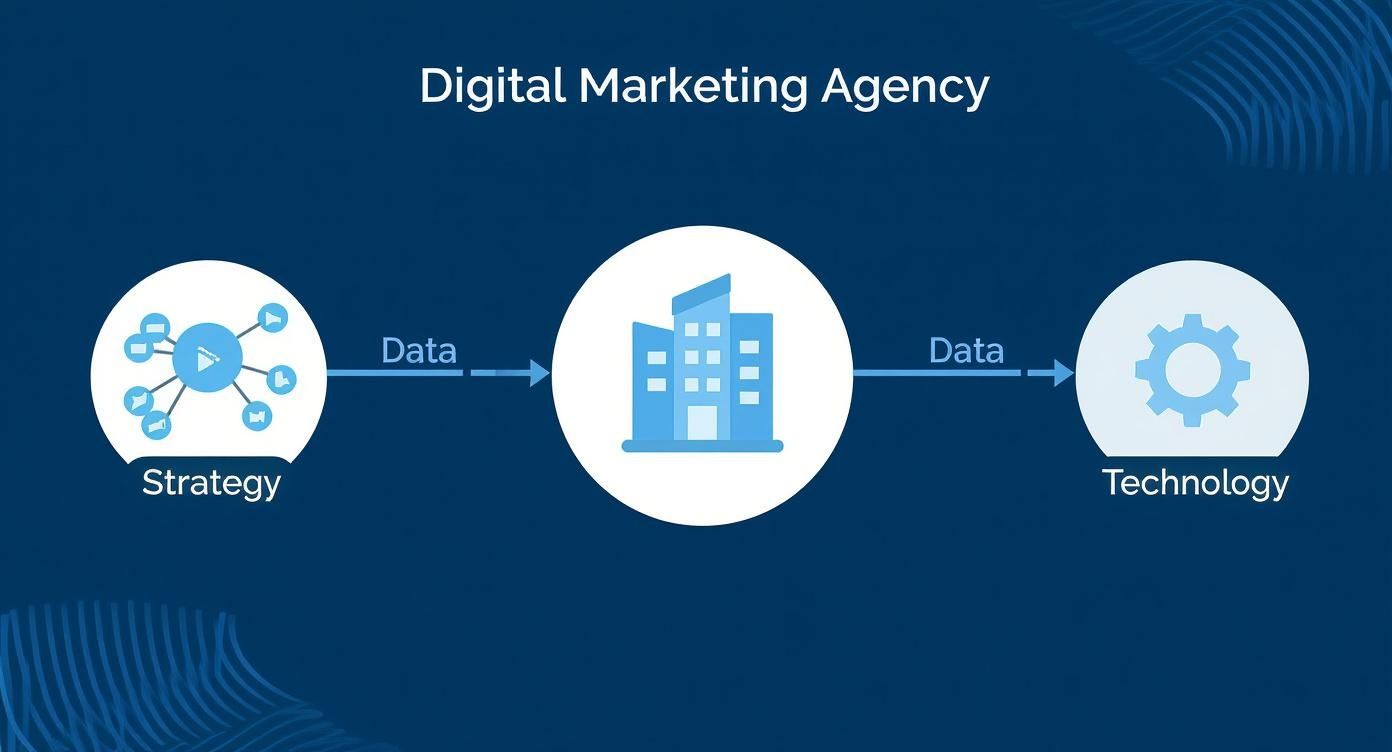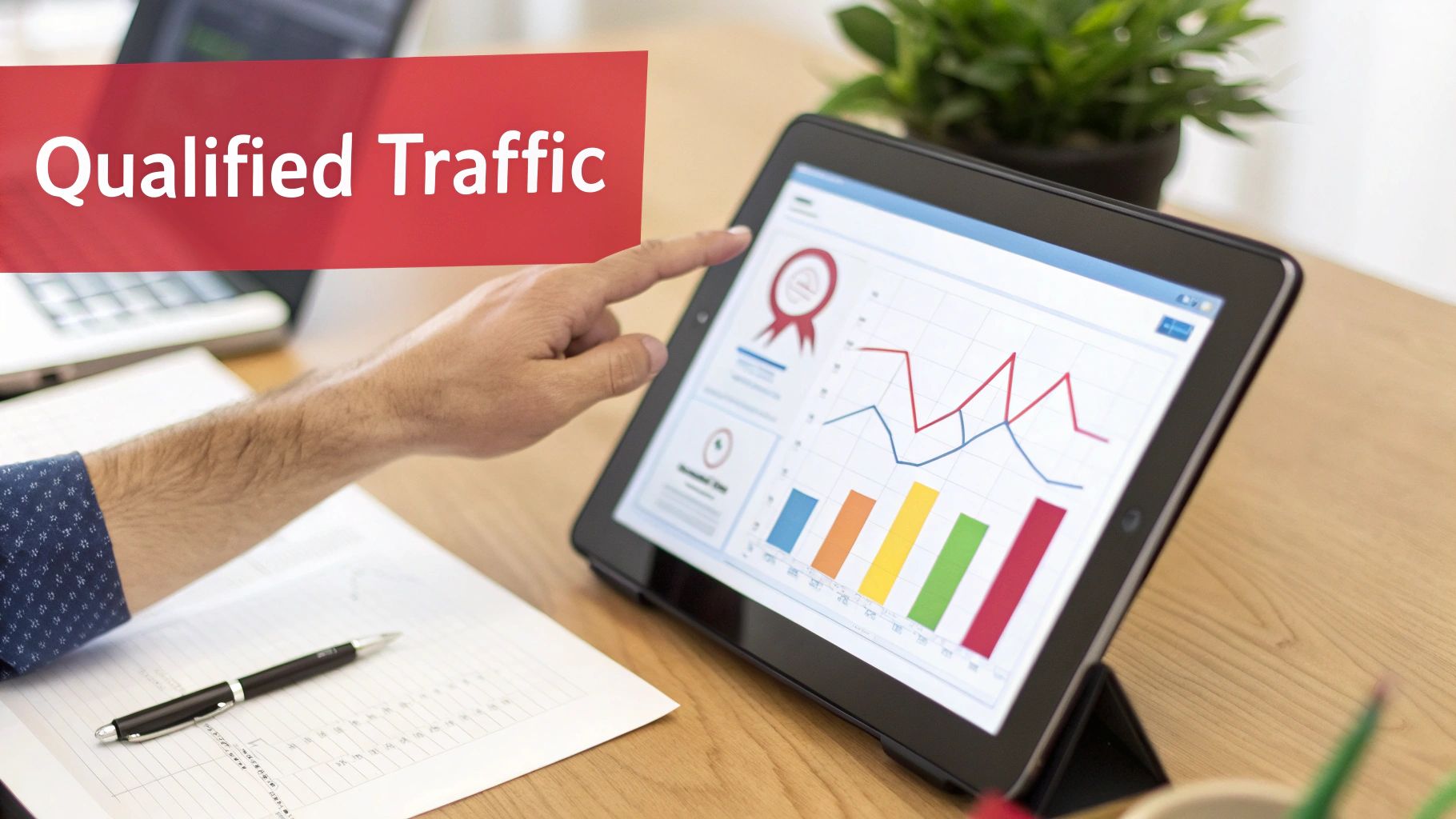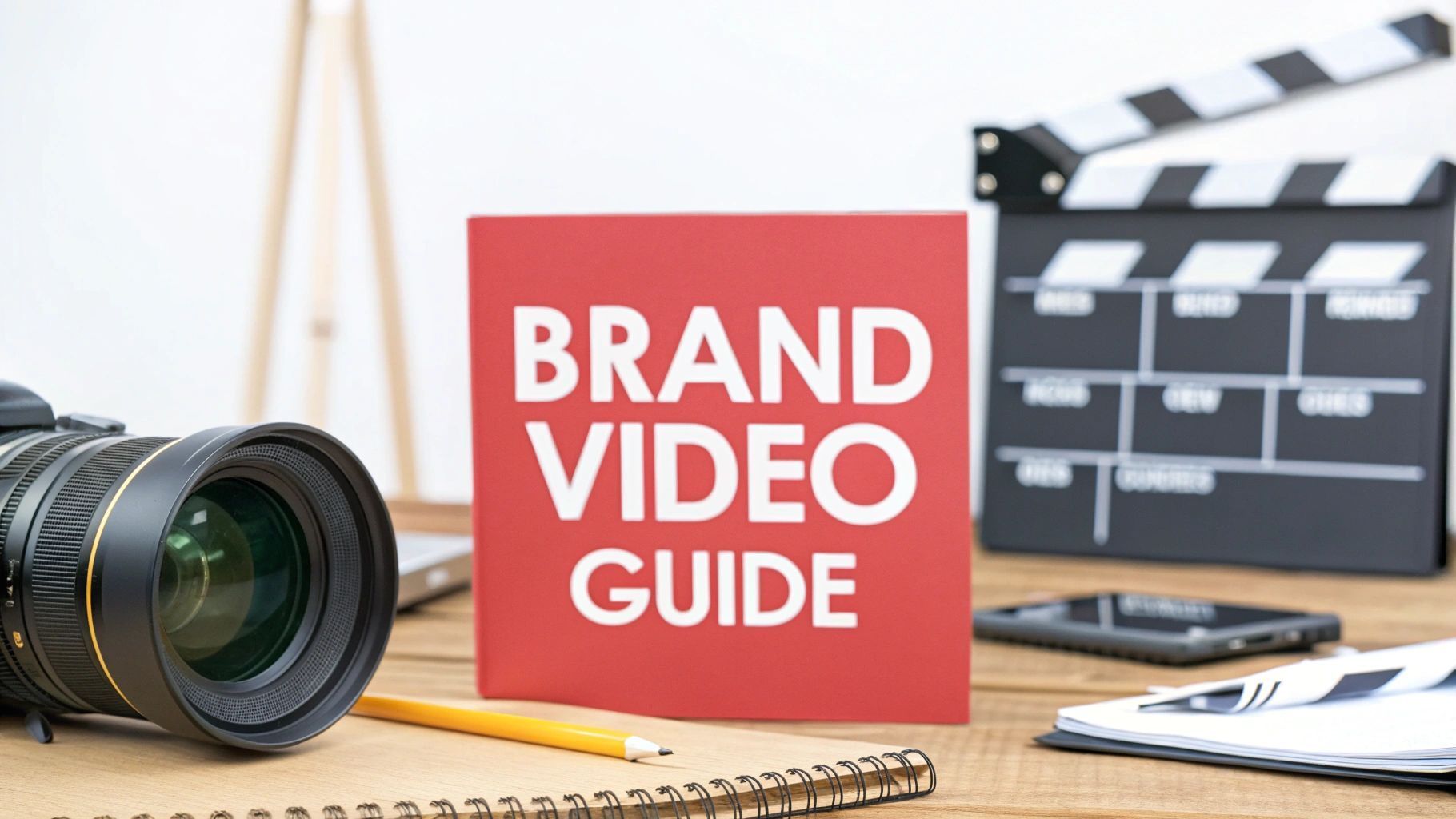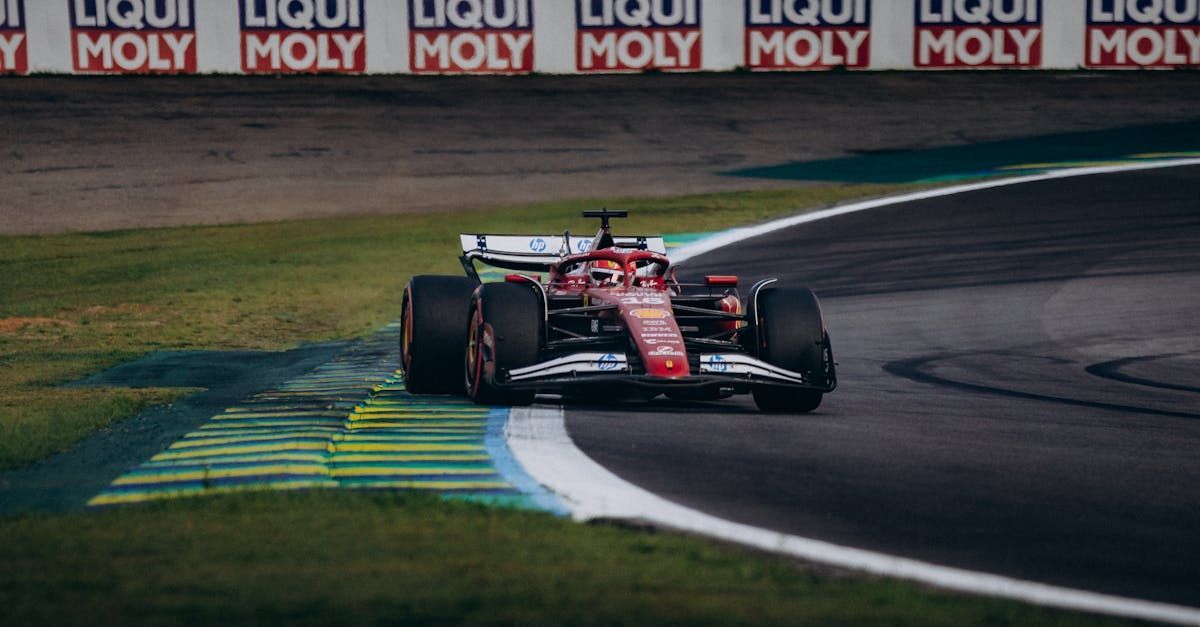Choosing a Digital Marketing Advertising Agency
Think of a digital marketing advertising agency like a specialist toolkit for your business's growth. Instead of trying to buy every single tool and figure out how to use it, you hire an expert who already owns the best kit and knows exactly how to get the job done right. They’re strategic partners, focused on expanding your online presence and delivering results you can actually see.
What Is a Digital Marketing Advertising Agency?
Simply put, it's an external team of specialists you hire to plan, execute and manage your online marketing and advertising. This partnership frees you up to focus on what you do best—whether that's developing new products or looking after your customers—while they handle the complex world of connecting with your audience online.
They’re not just a service provider; they’re a collaborator. An agency acts as your outsourced marketing department, bringing the strategy, data analysis and tech know-how needed to compete. Because they work across different industries, they bring fresh perspectives and proven methods that an in-house team might not have access to.
Your Strategic Partner in Growth
A common mistake is thinking an agency just ticks boxes on a to-do list. In reality, a great digital marketing advertising agency starts by understanding your business goals and then builds a solid plan to get you there. This means digging deep into your market, your competitors and your customers to figure out the most effective channels and messages.
They bridge the gap between your business objectives and the digital tactics needed to hit them. Let's say your goal is to increase sales by 20% . The agency won't just run a few ads; they’ll develop a multi-channel strategy that could include:
- Search Engine Optimisation (SEO) to pull in customers who are actively searching for what you offer.
- Pay-Per-Click (PPC) campaigns to drive immediate traffic and generate leads.
- Social media marketing to build a community around your brand and foster loyalty.
To give you some context, the UK’s online marketplace is getting more crowded by the day. By 2025, the digital advertising industry here is expected to be worth over £40 billion . This shift is happening because that's where the customers are. Right now, 89% of UK businesses use social media for marketing and 77% rely on SEO to get noticed. You can discover more about what this means in our full guide here.
In such a competitive space, having a knowledgeable agency partner isn't just a nice-to-have; it's essential. If you want to dive deeper into what separates a good agency from a great one, it's worth exploring the core digital advertising agency (DAA) principles. Understanding what a digital agency really does is the first step toward finding the right partner to help your business win.
Understanding Core Agency Services
A digital marketing advertising agency isn't just a collection of specialists; it's a team of problem-solvers who work in concert. Think of it like a Formula 1 pit crew. Each member has a highly specific job but they all work together with incredible precision to achieve one goal: winning the race. When their efforts are combined, they create momentum that drives real, measurable growth for your brand.
To really get a feel for what a full-service agency does, you have to look under the bonnet at the individual components. Each service is a specialised tool and knowing which one to use—and when—is what separates the experts from the amateurs.
Let's break down the five foundational pillars you'll find at the core of any modern agency.
This infographic shows how a digital marketing advertising agency blends strategy, data and technology to get results.

Search Engine Optimisation (SEO)
Search Engine Optimisation, or SEO , is the craft of making your website the most relevant and authoritative answer to a customer's search on Google. Imagine your website is a new book in a massive library. SEO is everything you do to make sure the librarian (Google) not only finds it easily but also recommends it first when someone asks a question your book can answer.
The goal is to land on the first page of search results for terms your ideal customers are using. This drives a steady stream of "organic" traffic—people who are actively looking for exactly what you offer, without you paying for every click.
Effective SEO is a mix of three key disciplines:
- Technical SEO: Ensuring your website's foundation is solid, fast and easy for search engines to crawl.
- On-Page SEO: Fine-tuning your content, from headlines to the text itself, to perfectly match what users are searching for.
- Off-Page SEO: Building your site's reputation across the web by earning high-quality links from other trusted sources.
At its core, SEO solves the critical business problem of visibility. If you don't show up on Google, for most potential customers, you simply don't exist.
Pay-Per-Click (PPC) Advertising
While SEO builds your brand’s authority for the long haul, Pay-Per-Click ( PPC ) advertising gets you in front of customers immediately. Think of it as renting a prime advertising spot on the busiest digital high street in the world. The best part? You only pay when someone interested enough to stop and look at your shop window actually walks through the door.
This is done on platforms like Google Ads or Microsoft Ads. You bid on keywords and your advert appears right at the top of the search results when someone searches for them. You're only charged when they click.
A smart PPC campaign isn’t about having the deepest pockets; it’s about spending your budget with pinpoint accuracy. It allows you to target users based on their location, interests, demographics and even their recent online activity.
PPC solves the need for instant, targeted traffic. It's the perfect tool for launching a new product, promoting a limited-time offer, or generating leads fast while your SEO strategy gathers steam.
Social Media Marketing
Social Media Marketing is not about shouting into the void; it's about building a community and starting conversations. It’s the process of turning your business from a faceless logo into a personality that customers actually want to connect with on platforms they use every single day.
A good agency develops a strategy to create and share content that truly resonates on channels like Instagram, Facebook, LinkedIn, or TikTok. The aim isn't just to get likes but to build genuine brand loyalty, drive people to your website and create advocates who share your story for you. You can see how different channels require unique approaches by exploring various digital media marketing specialities.
This solves the problem of brand engagement. It gives your business a human voice and a direct line to your audience, building the kind of trust that keeps customers coming back.
Content and Film Production
Content is the fuel for everything else you do in digital marketing. Content and Film Production is the art of creating genuinely interesting stories and valuable information that grabs your audience's attention and holds it. This can be anything from in-depth blog posts and sharp infographics to broadcast-quality films and podcasts.
Think of your content as the substance behind your brand's voice. A slick, well-produced video can explain a complex idea in 60 seconds. An expert article can position you as the go-to authority in your field. An agency handles the entire process—from scripting and filming to post-production—to deliver something that makes you look like the obvious choice.
This service solves one of the biggest challenges online: cutting through the noise. In a world of endless scrolling, exceptional content is what makes your brand impossible to ignore.
Web and App Development
Your website or mobile app is your digital headquarters. It’s the central hub where every marketing channel eventually leads. Web and App Development is the discipline of building that digital home to be functional, intuitive and impressive.
This is about much more than just looks. A professional development team ensures your site is secure, loads in a flash and works flawlessly on any device, from a phone to a desktop. For many businesses, a custom app provides an even more powerful way to connect directly with their most loyal customers.
This service is the foundation for everything. It solves the need for a professional, reliable and high-performing online platform that turns visitors into customers.
Measuring Success with Meaningful Metrics
Hiring a digital marketing agency is only half the job. The other half is figuring out if their work is actually paying off. It’s easy to get a good feeling from a spike in website visitors or a few more social media likes but these are often just vanity metrics. Real success is measured by the numbers that directly impact your bottom line.

This is where Key Performance Indicators ( KPIs ) come in. Think of KPIs as the specific, measurable signposts that show how effectively you're hitting your main business goals. A good agency will sit down with you to define these right from the start, making sure everyone is pulling in the same direction. They turn marketing activity into a clear story about business growth.
Forget the jargon. The focus should always be on the metrics that actually matter. Let's look past the surface-level numbers and get into the KPIs that reveal the true impact of your marketing spend.
Moving Beyond Vanity Metrics
It’s easy to be impressed by big numbers but not all traffic is created equal. A thousand visits to your website mean nothing if none of those people are potential customers. A smart agency changes the conversation from generic traffic to qualified traffic —visitors who actually fit your ideal customer profile and are far more likely to buy something.
This distinction is everything. Qualified traffic is the lifeblood of your sales pipeline. It proves your marketing isn't just reaching people; it's reaching the right people.
The ultimate goal is to connect every pound spent on marketing to the revenue it generates. This requires a disciplined approach to tracking, focusing on metrics that demonstrate tangible business value rather than just online activity.
To get that kind of clarity, you need to get comfortable with a few core financial and performance metrics. Every business owner should have these on their radar.
Key Performance Indicators That Drive Growth
Getting to grips with these numbers empowers you to hold your agency accountable and make sharp, informed decisions. They give you a crystal-clear view of your marketing’s financial performance.
Here are three of the most important KPIs to track:
- Customer Acquisition Cost (CAC): This is the total cost of your sales and marketing efforts to win a single new customer. You work it out by dividing your total marketing spend over a set period by the number of new customers you gained in that time. A low CAC means you have an efficient marketing machine.
- Return on Ad Spend (ROAS): This metric tells you the gross revenue you've generated for every pound spent on advertising. For instance, a ROAS of 5:1 means you're earning £5 in revenue for every £1 you put into ads. It's a direct measure of how profitable your campaigns are.
- Conversion Rate Optimisation (CRO): This isn't a single metric but the continuous process of improving the percentage of users who take a specific action (like making a purchase or filling out a form). Even tiny improvements in your conversion rate can have a massive impact on your revenue, often without needing to increase your marketing budget.
These metrics work together to paint a complete picture. A great agency won’t just report on them; they’ll actively use them to refine and improve your campaigns month after month. To get a better handle on this, it's well worth your time mastering marketing performance metrics so you can confidently judge your agency's impact.
Why Your Industry Needs a Different Playbook
A marketing strategy that works wonders for an online fashion brand would fall completely flat for a financial services firm. It's an obvious point but one that many businesses overlook when searching for an agency. The channels you use, the messages you craft and the tactics you deploy have to be tailored to the specific world you operate in.
A top-tier digital marketing advertising agency gets this. They don't roll out a generic, one-size-fits-all solution. Instead, they start by understanding the unique challenges, customer behaviours and even the unspoken rules of your industry.
This specialised knowledge is everything. It means the agency already speaks your language, understands the regulatory hurdles and knows what your customers actually care about. Let’s look at how this plays out in a few very different sectors.
Motorsport: It’s All About High-Octane Engagement
Marketing in motorsport is about tapping into pure, raw passion. Fans aren't just customers; they're a tribe. A winning strategy here goes way beyond simple ads. It’s about creating visceral, high-impact content that captures the speed, the drama and the heart-pounding excitement of the sport.
That means behind-the-scenes video, raw driver vlogs and live social media takeovers on race weekends. The goals are simple but powerful:
- Build a die-hard community: Create a home where fans can connect with the team and with each other, forging a powerful sense of belonging.
- Show sponsors the money: Weave sponsor brands authentically into thrilling content that demonstrates a clear, tangible return on their investment.
Success isn't measured in website clicks. It's measured in community growth, engagement rates and how much value you're delivering for the partners who make it all possible.
Automotive: Navigating a Complex Customer Journey
Buying a car isn't an impulse purchase. It's a huge decision that involves weeks, sometimes months, of research. The customer journey is long and winding, starting with online reviews and ending, hopefully, with a visit to a dealership. An effective automotive strategy has to guide buyers through every single step.
It starts with sharp SEO, making sure your dealership pops up for local searches like "EV dealer in Devon." From there, it's about using targeted content—think detailed model comparisons, finance calculators and virtual test drives—to build trust and answer questions before they're even asked.
The real magic is in creating a seamless bridge between the online world and the showroom floor. Digital ads should drive real footfall and the data from a customer's online journey can tell your sales team exactly what they're looking for before they even walk through the door.
Here, the focus is squarely on lead generation, booking test drives and ultimately, selling cars.
Tourism: You’re Not Selling a Holiday, You’re Selling a Dream
Tourism marketing is about selling an experience, an aspiration. The content has to be visually breathtaking and emotionally resonant, inspiring people to imagine themselves in that perfect destination. This is where professional film and photography become non-negotiable; you have to tell a story that people want to be a part of.
Seasonal campaigns are also crucial. A smart agency plans promotions around peak holiday times, school breaks and local events to fill rooms and book tours when it matters most. Common strategies include:
- Influencer collaborations: Partnering with travel creators who can showcase a destination with genuine excitement.
- User-generated content: Encouraging visitors to share their own photos and videos, creating powerful social proof that no ad can replicate.
- Hyper-targeted advertising: Using data to reach people based on their travel interests, past booking habits and location.
In tourism, the KPIs that matter are booking conversions, seasonal revenue and the overall online vibe around your brand.
Finance: Where Trust Is the Only Currency
The financial sector is built on a foundation of trust and credibility. There's no room for error. Marketing for banks, investment firms, or insurance companies must be authoritative, professional and perfectly aligned with strict industry regulations from bodies like the Financial Conduct Authority (FCA).
Content is king here but it has to be educational, not salesy. We're talking expert guides on investment strategies, articles that demystify complex financial products and webinars that establish the firm as a genuine thought leader. The tone is always reassuring and professional.
In this world, a single misstep can have massive legal and reputational blowback. That's why an agency with proven experience in financial services isn't just a nice-to-have; it's a necessity. The goal is to generate highly qualified leads while building an unshakable reputation for reliability and expertise.
How to Choose the Right Agency Partner
Picking a digital marketing agency is one of the biggest calls a business can make. This isn’t like hiring a supplier; it’s about finding a strategic partner who’ll be elbow-deep in your company’s growth. Get it right and you gain a powerful ally. Get it wrong and you're looking at wasted budgets and opportunities that have sailed on by.

The market for these services is humming. The UK's digital ad agency sector saw the number of businesses grow at an annual rate of 5.8% between 2017 and 2022, which tells you just how much demand is out there. With so many options, you need a solid process to cut through the noise and find someone who genuinely gets your business. If you want to dig deeper into these trends, you can discover more insights about marketing agency statistics and see the bigger picture.
This guide will give you a framework to make a choice you can feel confident about.
Your Agency Evaluation Checklist
Before you put pen to paper on any contract, it's time to do your homework. A structured approach means you cover all the important bases and can compare agencies on a level playing field.
The table below breaks down the essential questions you should be asking. Think of it as your roadmap for vetting potential partners, ensuring you don’t miss a single crucial detail.
| Area of Evaluation | Key Question to Ask | What to Look For |
|---|---|---|
| Proven Track Record | "Can you show me specific case studies from clients similar to us?" | Real, tangible results, not just vague promises. Look for evidence they’ve solved problems like yours before. |
| Communication & Transparency | "What does your reporting and communication process look like?" | A clear schedule, a dedicated point of contact and total honesty about what's working and what isn't. |
| Team & Culture | "Who will actually be working on our account and can we meet them?" | The people behind the pitch. A good cultural fit is essential for a smooth, long-term working relationship. |
| Strategic Approach | "How will you get to know our business goals before recommending tactics?" | A genuine interest in your 'why'. A true partner starts with your objectives, not their list of services. |
Running through these points will quickly separate the serious contenders from the agencies just going through the motions. It’s all about finding a team that invests in your success as much as you do.
Understanding Agency Pricing Models
Agency fees aren't one-size-fits-all and knowing the difference between the models is key to finding a setup that works for your budget and goals. Each has its place.
The right pricing model creates a win-win. It should give the agency the stability to do great work while giving you complete clarity on the value of your investment.
Here's a quick look at the three most common structures:
-
Retainer: You pay a fixed fee each month for an agreed scope of work. This is perfect for ongoing, long-term partnerships like SEO or content creation as it allows for consistent effort and strategic planning over time.
-
Project-Based: This is a one-off fee for a project with a clear start and end, like a website redesign or a three-month campaign launch. It’s ideal when you have a single, well-defined goal.
-
Performance-Based: The agency's fee is tied directly to the results they generate—think leads, sales, or sign-ups. It sounds tempting but this model often comes with a higher base fee and only works for campaigns where results can be tracked with pinpoint accuracy.
Red Flags to Watch Out For
Just as important as knowing what to look for is knowing what to run away from. Some promises are just too good to be true and often signal an inexperienced or, worse, dishonest agency.
Be wary of any digital marketing advertising agency that:
- Guarantees Number One Google Rankings: Nobody can promise this. SEO is a complex game and the rules are always changing. A proper agency focuses on best practice and sustainable growth, not impossible guarantees.
- Lacks Transparency: If they get cagey about their methods (“it’s our secret sauce”) or won't give you access to your own analytics accounts, head for the door. It's your data and you should always own it.
- Uses High-Pressure Sales Tactics: A confident, professional agency will give you the time and space to make an informed decision. Anyone pushing rushed timelines or "act now" offers is a major red flag.
- Has Poor Communication: If they’re slow to respond or unclear in their emails during the sales process, just imagine what they'll be like once they have your money. This is often the clearest early sign of their client service standards.
Our Advantage: AI, Video and Real-World Expertise
When you’re choosing an agency, it all boils down to one simple question: what makes you different? So many agencies offer the same list of services but the real value isn't in the what , it's in the how. The difference lies in the specific expertise and advanced tools an agency brings to the table.
This is where a truly forward-thinking digital marketing advertising agency pulls away from the crowd. It’s about moving beyond the standard playbook to give clients a genuine commercial edge.
At Superhub, we’ve built our advantage on three core pillars: our own bespoke AI technology, a professional in-house video production team and deep, first-hand experience in some of the most competitive industries out there. This blend means our strategies aren’t just well-executed; they’re potent.
AI-Driven Lead Generation
We developed our own fully automated lead generation system, powered by custom AI. Think of it as a scout working for you 24/7 , tirelessly identifying and qualifying prospects who are genuinely interested, with a precision that manual methods just can't touch.
This system allows us to build incredibly efficient and targeted campaigns. It cuts down on wasted ad spend and makes sure your message lands in front of the people most likely to become customers. In a similar vein, smart agencies are also using tools like AI-powered comment management solutions to work smarter, not harder, on client engagement.
In-House Film and Video Production
In a world scrolling through visual content, high-quality video isn’t a nice-to-have; it’s a must. Unlike agencies that have to outsource this critical function, we have a complete in-house film and video production crew.
This gives us total creative control. It lets us produce compelling visual stories that grab attention and drive results, whether it’s a broadcast-quality commercial or a punchy clip for social media.
Having these capabilities under one roof means we're more agile, cost-effective and consistent with your brand's voice. Every single piece of content perfectly aligns with your strategic goals.
This integrated approach solves a huge headache for businesses: getting professional video made quickly, without the logistical nightmare of juggling multiple suppliers.
Deep Sector-Specific Expertise
Our team has serious, hands-on experience in complex and demanding sectors like motorsport, automotive, tourism and finance. We don’t just know the marketing tactics; we get the market dynamics, the customer mindset and the commercial realities of these industries.
For example, our motorsport division has a proven track record of securing sponsors for racing teams and drivers—a notoriously tough challenge. This isn't just theory; it's experience earned in the paddock and the boardroom.
This deep knowledge means we create strategies that feel authentic to your audience and deliver tangible results, whether that’s filling a race car with sponsors or a hotel with guests.
Your Questions Answered
Stepping into a partnership with a digital marketing agency is a big decision and it’s smart to have questions. Here are some straight answers to the things we’re most often asked, helping you get a clearer picture before you commit.
How Quickly Will I See Results?
This is the big one and the honest answer is: it depends on the strategy. If we’re running a PPC advertising campaign, you’ll see traffic and leads almost instantly – often within the first week. It’s direct, fast and measurable from day one.
But for things like SEO and content marketing, it’s more of a long game. Think of it like planting a tree, not flicking a switch. You should start seeing positive signs – like better rankings and a lift in organic traffic – within three to six months . The real, substantial growth and a solid return on your investment tend to show up from six months onwards.
How Much Should I Budget for an Agency?
Agency costs can range massively and it all comes down to the scope of work, your industry and what you’re trying to achieve. A small local business might invest a few thousand pounds a month, while a national brand with ambitious goals could be looking at tens of thousands.
Instead of asking, "How much does it cost?", a better question is, "What level of investment do I need to actually hit my goals?". A great agency won’t just give you a price list. They’ll work with you to match your budget to realistic outcomes, making sure every pound you spend has a clear purpose.
What’s My Role in All This?
Your involvement is absolutely vital. We’re the experts in digital marketing but you’re the expert on your business. While we handle the strategy and the technical side of things, we need your insights on your industry, your customers and your business goals.
The best agency relationships are true collaborations. Your role is to set clear objectives, give feedback on strategy and be available for regular catch-ups. When your business knowledge meets our marketing expertise, that’s when the magic happens.
Do I Still Need My In-House Marketer?
In many cases, yes. An in-house marketing manager or coordinator is the perfect bridge between your business and the agency. They’re on the ground, managing the day-to-day relationship and making sure our efforts are perfectly aligned with what’s happening inside your company.
This person doesn’t need to be an expert in every digital channel – that’s our job. Their real value is in keeping communication seamless and ensuring the agency feels like a genuine extension of your team.
Ready to see how a specialist agency can drive real growth for your business? Superhub combines bespoke AI technology, in-house video production and deep sector expertise to deliver strategies that get results. Contact us today to start the conversation.
Want This Done For You?
SuperHub helps UK brands with video, content, SEO and social media that actually drives revenue. No vanity metrics. No bullshit.



